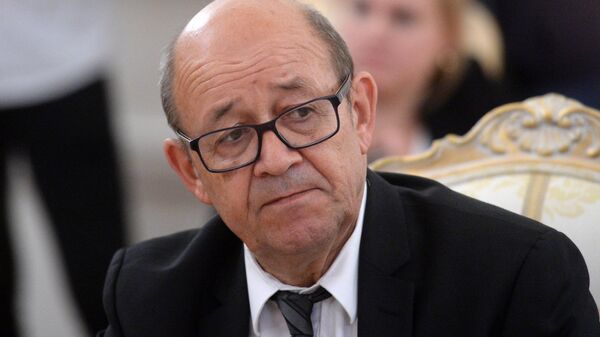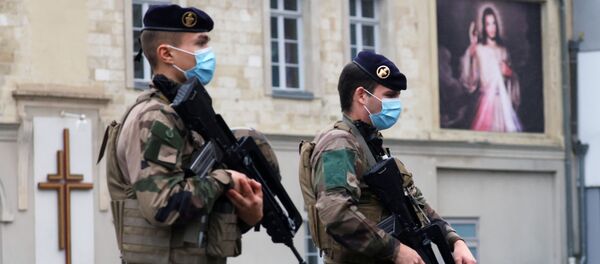French Foreign Minister Jean-Yves Le Drian has arrived in Egypt in a bid to ease tensions between Paris and the Muslim world. The official "will pursue the appeasement process" set out by President Macron, the Foreign Ministry said in a statement.
A diplomatic source, who spoke with the news agency Agence France Press said the foreign minister would meet Egypt's President Abdel Fattah al-Sisi, his counterpart Sameh Shoukry, and Ahmed al-Tayeb, the Grand Imam of Al-Azhar, a prestigious title in Egypt.
Last month, Ahmed al-Tayeb denounced statements about Islamist separatism made by President Emmanuel Macron as "racist" and said the French president was spreading "hate speech". He also called on the international community to criminalise anti-Muslim actions.
During a joint press conference with his Egyptian counterpart Jean-Yves Le Drian addressed the Grand Imam of Al-Azhar, saying France respects Islam, but strongly condemns calls for a boycott that were made in response to President Macron's statements.
Relations between Paris and the Muslim world became strained last month. At the beginning of October, President Macron spoke about the government's plans to introduce new measures aimed at tackling what he described as "Islamist separatism" and defending secular values. He said Islamist separatism posed a danger to France because it creates a "counter-society" and holds its laws above all others.
"Islam is a religion that is in crisis all over the world today, we are not just seeing this in our country", the Macron said.
The measures announced by the French president include:
- control over the financing of mosques and religious organisations in France;
- suspension of programmes on hosting imams from foreign countries;
- monitoring of sports organisations and other programmes to prevent them from becoming a front for Islamist teaching.
The statements and the proposed measures raised eyebrows in the Muslim world and many criticised France for attempting to supress Islam in the country.
However, it's not these remarks that put Paris on a collision course with the Muslim world, but Macron's statements about the murder of a schoolteacher in a Paris suburb on 16 October. Samuel Paty was beheaded by an 18-year-old immigrant, who learned that the teacher had shown caricatures of the Prophet Muhammad during classes dedicated to freedom of speech.
Islam's holy book, the Quran, doesn't say anything about depictions of Allah or the Prophet Muhammad, nevertheless for many Muslims the issue is a taboo, while satire about the religion is considered blasphemous and in some countries is punishable by death.
Macron has strongly condemned the murder of Paty, which he described as a terrorist attack and defended the right to publish and use cartoons, saying it is protected under France's right to free speech.
These statements caused an uproar in many Muslim countries, with the leaders of Pakistan and Turkey fiercely criticising Macron's rhetoric. The Turkish president called for a boycott of French goods and said Muslims are being subjected to a "lynching campaign similar to that against Jews in Europe".
Following the row several terrorist attacks occurred inside and outside France.
Egyptian President Abdel Fattah al-Sisi cautioned against linking Muslims to Islamist extremists. "In a world of 1.5 billion Muslims, what percentage of them do you think are extremists", he said.



